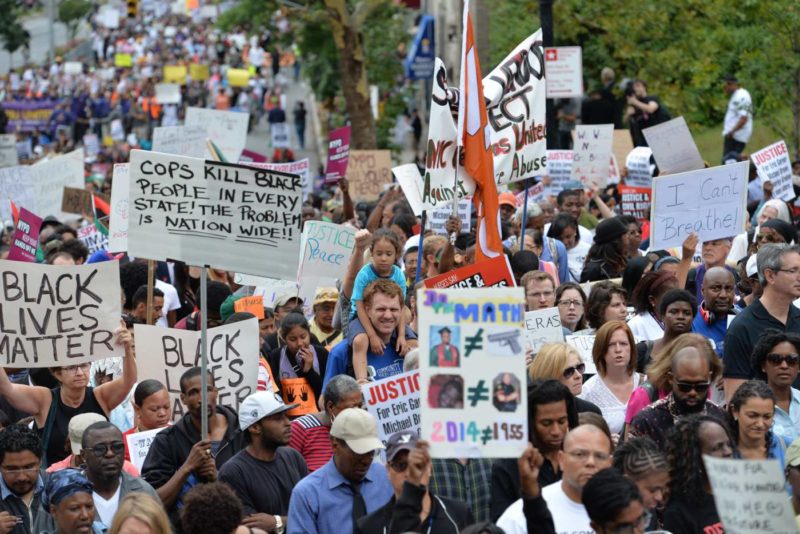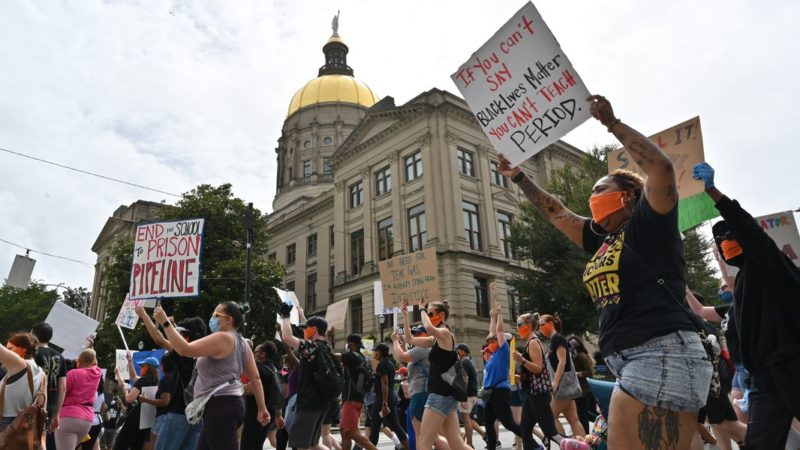Special News Series: Rising Up For Justice! – BLM helped shape the 2020 election. The movement now has its eyes on Georgia.
Share
Explore Our Galleries
Breaking News!
Today's news and culture by Black and other reporters in the Black and mainstream media.
Ways to Support ABHM?
Introduction To This Series:
This post is one installment in an ongoing news series: a “living history” of the current national and international uprising for justice.
Today’s movement descends directly from the many earlier civil rights struggles against repeated injustices and race-based violence, including the killing of unarmed Black people. The posts in this series serve as a timeline of the uprising that began on May 26, 2020, the day after a Minneapolis police officer killed an unarmed Black man, George Floyd, by kneeling on his neck. The viral video of Floyd’s torturous suffocation brought unprecedented national awareness to the ongoing demand to truly make Black Lives Matter in this country.
The posts in this series focus on stories of the particular killings that have spurred the current uprising and on the protests taking place around the USA and across the globe. Sadly, thousands of people have lost their lives to systemic racial, gender, sexuality, judicial, and economic injustice. The few whose names are listed here represent the countless others lost before and since. Likewise, we can report but a few of the countless demonstrations for justice now taking place in our major cities, small towns, and suburbs.

To view the entire series of Rising Up for Justice! posts, insert “rising up” in the search bar above.
Black Lives Matter helped shape the 2020 election. The movement now has its eyes on Georgia.
Founder Patrisse Cullors on the Senate runoffs, the impact of the protests, and what the movement wants from the Biden administration.
By Rachel Ramirez, Vox
November 27, 2020

The police killings of George Floyd and Breonna Taylor set off protests like the nation has never seen — more than 15 million people marched in the name of justice for Black lives this summer. So it’s no surprise that the rallying cry out on the streets was still on voters’ minds when they cast their ballot in November.
According to preliminary data from AP VoteCast, a comprehensive survey conducted for the Associated Press by NORC at the University of Chicago, roughly a fifth of all voters said the racial justice protests were the single most important factor when voting in the election.
But just like Americans’ views on wearing a mask or social distancing, the protests have become a politically divisive issue — 53 percent of those voters went for Biden, 46 percent voted for Trump. Some conservative voters focused on the small percentage of looting and vandalism associated with the unrest, calling the protests “childish,” according to interviews conducted by the New York Times, while progressives and first-time voters were inspired by the movement to make radical change.
In the end, the Black Lives Matter movement and protests shaped the results of the election: Many organizers worked to get people out to vote, with Black voters turning out in droves, despite obstacles of voter suppression. Black voters also helped flip key battleground states like Georgia and Pennsylvania to elect Joe Biden, while voters in cities across the country approved ballot measures on police accountability.
Still, despite these wins, there is much work to be done, according to both activists and Democratic voters. Patrisse Cullors — one of three women founders of Black Lives Matter, along with Alicia Garza and Opal Tometi — says this work must remain constant and varied.
“We are going to use protests,” Cullors told Vox. “We’re also going to use our power, and the halls of power to make sure change happens.”
This includes launching a political action committee to raise funds to elect and defeat candidates — a big step for a grassroots organization like Black Lives Matter. Meanwhile, organizers in cities and towns across the country — the movement has no single leader — will continue to mobilize local communities in the fight against police violence.
I spoke with Cullors about how the protests impacted the elections, how Americans can address the political divide in this country, and what to expect from the organization in the new Biden-Harris administration. Our conversation has been lightly edited for length and clarity…
Read the full article here.
More Breaking News here.
Explore the ABHM galleries here.









Comments Are Welcome
Note: We moderate submissions in order to create a space for meaningful dialogue, a space where museum visitors – adults and youth –– can exchange informed, thoughtful, and relevant comments that add value to our exhibits.
Racial slurs, personal attacks, obscenity, profanity, and SHOUTING do not meet the above standard. Such comments are posted in the exhibit Hateful Speech. Commercial promotions, impersonations, and incoherent comments likewise fail to meet our goals, so will not be posted. Submissions longer than 120 words will be shortened.
See our full Comments Policy here.